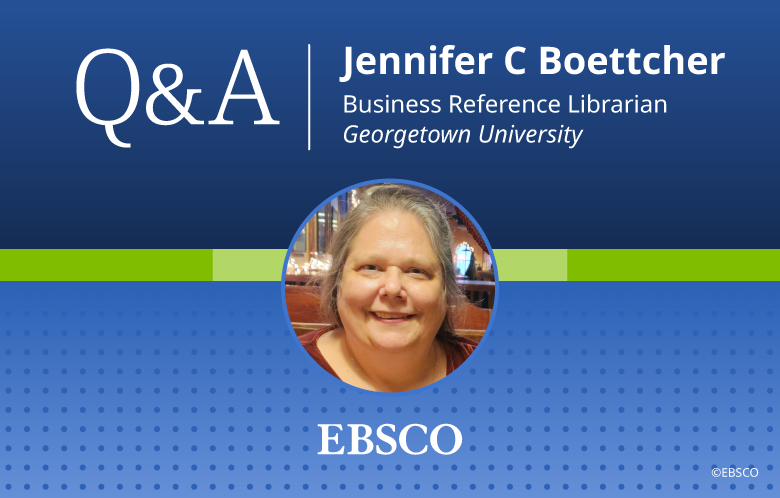Sponsored by EBSCO, the award consists of $5,000 for an individual that has made a distinguished contribution to reference librarianship. Isadore Gilbert Mudge was a librarian from 1903-1941 who coined the phrase “material, mind, and method” to describe her reference philosophy.
The Award Committee chose Jennifer “in recognition of her outstanding contributions to reference librarianship, her leadership in ALA and RUSA, her many scholarly publications and presentations, her mentorship, and her national impact on business librarianship and government information.”
We spoke with Jennifer about this achievement.
You have received various awards in your tenure as a librarian. What does it mean to you to be the recipient of the Isadore Gilbert Mudge Award?
I was greatly honored when I learned that my colleagues wanted to put me forward for this award. It’s nice to be recognized by RUSA and I’m glad to represent business librarians in the public service field. Isadore Mudge was very influential in education, and it's great to receive an award in her name. It’s also amazing to think that the father of one of my friends was actually taught by her back in the day.
Tell us about your 30-year involvement with ALA and what you have learned from the organization.
I know that ALA is the right home for me because they recognize what libraries do and what librarians can contribute. I’m a firm believer in the mission of ALA, but I think there is a need to focus more on the people in the profession.
There are aspects of the community that people don't realize are actually touched by libraries, and ALA continues to do great work in the areas of privacy and intellectual freedom. And during the early days of the pandemic, ALA helped bring broadband access into rural or disadvantaged communities. So, I’m very proud to be part of that organization.
ALA conferences are great too. Even though some of the programming is designed for newbies, when you go to ALA it's about the friends that you meet up with: the people you've worked with on committees and those that you reconnect with. I don't know what we would do without ALA.
“Isadore Mudge was very influential, and it's nice to receive an award in her name.”
“Isadore Mudge was very influential, and it's nice to receive an award in her name.”
Part of your contributions include articles and books on government information as well as articles about NAICS codes. What piqued your interest in these topics?
I wanted to be a documents librarian because my dad was in the military and my mom worked for the State Department and they brought home lots of declassified publications like Background Notes. I found the Notes interesting, and it is information that is free and available to anyone, which fascinated me.
My first job out of library school was working for the New York State Small Business Development Center. I was put in charge of the physical vertical files, and I was looking for a way of classifying industries. From there I became interested in the SIC codes then NAICS codes, as a taxonomy of business, since codes are better than words for classification. Of course, the Census of Population and Housing was important for business librarians. I was more interested in industry information. While at an ALA conference I asked the publisher, “Well, what about the economic census?” And they said, “What's the economic census?” I told them what it was and that it's done every 5 years instead of every 10 years. So, they asked if I would be willing to write a book, and I was young and naive at the time, so I said yes and I found a co-author.
What do you think is the most important part of your role as a business reference librarian?
I help non-business students, primarily. There is not much research being done by students in business schools these days. However, business has infiltrated other academic fields and I find them more appreciative of my help. I also help them to get their work published, and I’ll show them how to do it. They're a little bit intimidated by the process, so I show them what I’ve done and encourage them.
You are recognized for your mentorship as well. How do you mentor other librarians? And why is mentorship so important to you?
Like most public service librarians, I like to help everyone. From the beginning of my professional career, I have taken on leadership, especially growing the profession. I was always mentoring or guiding as Chair of BRASS (the business section of RUSA), as an ALA Council member, and a vocal supporter of librarians. I love advising and I inform library workers of opportunities, help them navigate associations, and encourage them to publish, even by co-authoring with them.
I’m currently involved in mentoring through my role as a leader in the Capital Area Business Academic Librarianship (CABAL) which is a group I started in the DC area to connect with other business librarians. We meet quarterly, and since COVID we have a monthly “coffee chat,” where people get together to ask questions, learn how to do things, ask for career advice and also to satisfy that need to connect with others. I’m also active in my local SLA DMV Community where we are matching master students with experienced librarians. Mentorship is important to me because I had great mentors to guide me at different points who ended up becoming my dear friends, some of whom I see at ALA gatherings.
Jennifer is chairing a session at ALA in Chicago called Passion Project to Socially Conscious Business: Librarians Building Communities One Story at a Time. It takes place Monday, June 26, 2023, at McCormick Place, W184d.
